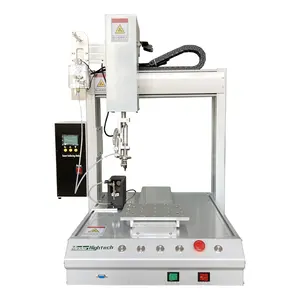Introduction to Automated Soldering Machines
An automated soldering machine is an essential tool in modern electronics manufacturing, designed to enhance efficiency, precision, and consistency in circuit assembly. These high-tech devices take on the laborious task of soldering, providing seamless connections between various electronic components. By leveraging advanced technology, automated soldering machines minimize human error and increase productivity, making them a cornerstone in automated production lines.
Types of Automated Soldering Machines
Automated soldering machines come in various configurations, each tailored to specific applications. Understanding these types can help businesses select the right solution for their production needs:
- Wave Soldering Machines: Ideal for PCB assemblies, these machines submerge the assemblies in molten solder to create reliable solder joints.
- Selective Soldering Machines: Used for specific areas of a PCB, selective soldering provides greater precision and is perfect for complex boards.
- Reflow Soldering Machines: These machines use controlled heating to melt solder paste, ensuring strong connections in surface-mount devices.
- Robotic Soldering Stations: With robotic arms, these stations offer unparalleled flexibility for soldering in varied locations, accommodating different component sizes.
Function and Feature of Automated Soldering Machines
Automated soldering machines are loaded with innovative features that streamline the soldering process. Here are some key functions and features to consider:
- High-Speed Operations: Many models are designed to perform soldering at a rapid pace, significantly speeding up production lines.
- Precision Control: Equipped with advanced controls, these machines ensure precise application of solder, reducing waste and improving quality.
- Temperature Regulation: Effective temperature control systems guarantee that solder joints are created under optimal conditions, contributing to better reliability.
- Integration with CAD Systems: Automated soldering machines can connect with Computer-Aided Design systems to streamline the transition from design to production.
Applications of Automated Soldering Machines
The applications of automated soldering machines span a broad spectrum across industries. They are a significant asset in sectors requiring high reliability and efficiency, including:
- Consumer Electronics: Automatically soldering components in smartphones, tablets, and personal gadgets.
- Automotive Industry: As vehicles incorporate more electronic components, automated soldering machines ensure reliable connections in automotive electronics.
- Medical Devices: In the manufacture of medical instruments where precision and reliability are critical, ensuring quality solder joints is essential.
- Aerospace Applications: Automated soldering is crucial in aerospace for maintaining high safety standards through reliable circuitry.
Advantages of Using Automated Soldering Machines
Investing in automated soldering machines offers numerous advantages that promote business growth and production efficiency:
- Increased Production Rate: Automation speeds up the soldering process, allowing for higher output within a shorter timeline.
- Consistency and Quality: Machines provide uniform solder joints, leading to improved product reliability and fewer defects.
- Cost-Effectiveness: While the initial investment may be significant, the reduction in scrap and rework costs results in long-term savings.
- Improved Workplace Safety: Automating soldering minimizes the need for manual handling of hot materials, contributing to a safer work environment.








































































































































































































